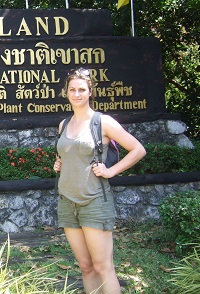 What year did you graduate and from which program?
What year did you graduate and from which program?
2003 – Natural Resources Conservation
Where did you grow up?
Stittsville, Ontario
Why did you choose UBC Forestry? And why the study of forestry?
I like the sound of the multi-disciplinary programme; the idea of studying biology, economics, sociology and policy all once really appealed to me as I thought it would be more useful/interesting than focussing on a single discipline. I was also keen to move to Vancouver.
What was your first job after graduation (related or not to your degree)?
I worked in Dr John Richardson’s stream and riparian ecology lab for the summer (my second year supporting one of his PhD students, Carin Bondar, with her research) and then in the Dean’s Office as an Associate Recuitment Officer for about 9 months
What are you doing now and how did you end up there?
After working in the Dean’s office, I moved to the UK to do an MSc in Nature, Society and Environmental Policy. I was hired by an environmental consulting company in Oxford called ProForest and started work there two weeks after handing in my MSc thesis. For the frst two years there I managed a project on the sustainable timber purchasing policy (used in construction, furniture, paper etc.) for the UK Government, as well as getting involved in similar work with other European Governments and the private sector, and broader issues such as illegal logging. A big part of this work involved forest certification schemes and I was fortunate to be involved in some field work for one of our private sector clients, a Brazilian plantation forestry company. Over the past three years, my focus has shifted to agriculture and I am now coordinating the company’s agriculture projects and am the lead person on biofuels (soy, plam, sugarcane, canola etc.), which is a really interesting, if sometimes controversial, topic these days. It links back to forestry as people start looking more at biomass and lignocellulosic fuels, and forests continue to be an important part of what I do: there are clear links between agricultural expansion and deforestation. My work on sustainabe agriculture has taken me all over, including SE Asia, Africa, India and South America, as well as working with a range of companies in the commodity supply chain, NGOs and Governments. I think its safe to say that I would not have gotten the job without my UBC forestry degree.
Do you have any fond memories of your time at UBC? (people, clubs, sports, classes, etc.)
Too many to list – but generally, being inloved in the FUS i.e. Christmas tree sales, social coordinator (Coconut…), yearbook. CONS 451 field school was fantastic, and working in the Richardson lab was good times as well. I love the building, I’ve been back a few times and am still awed by it. But it would have been nothing without the people – my friends and my professors who inspired me.
If you weren’t working where you are now, what profession would you most like to try?
Hmm…possibly writing or photography. I occasionaly I think I’d like to move to LA and be an actor, but then I remember I can’t act.
What is the toughest business or professional decision you’ve had to make?
Deciding to take the job in Oxford. I had not planned on staying in the UK, and I thought I wanted to work on EU policy or maybe on development issues in Africa. I wasn’t even that sure about what ProForest actually did at the time. However, I have no regrets about the decision I took, particularly as it turns out I now regularly get to work on EU policy and sustainability/development issues in Africa anyway!
What do you aspire to 10 years from now? (personally and/or professionally)
I’d like to have figured out what I’d like to do with my life, and where I’d like to like to live.
Do you have any advice for students considering enrolling in forestry?
It’s a great Faculty, a nice size (not too overwhelming), and the people that study forestry and generally fun and genuinely interested in what they are learning. My advice would be to get involved in as much as possible, both in terms of the FUS social stuff as well as going to the public lectures and working for professors.
Is there anything else you’d like to share?
Hello to all my old classmates reading Branchlines!
From Branchlines September 2010